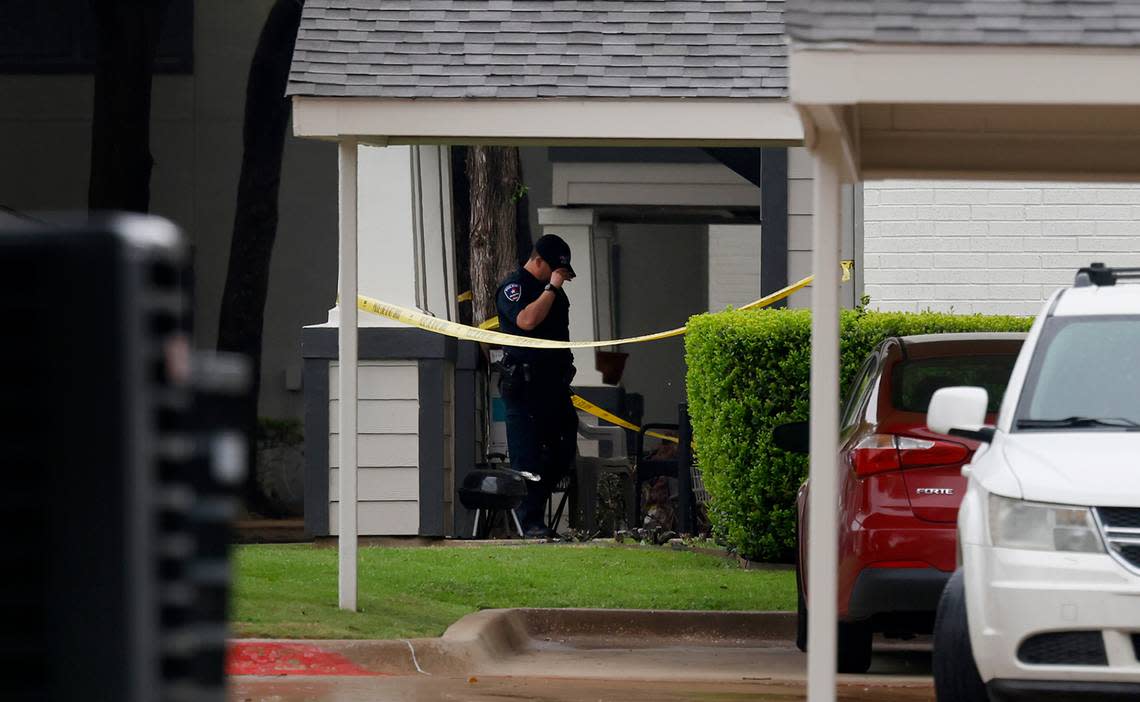What are welfare checks, and are firefighters the right first responders for them?

Tarrant County residents are looking for answers after an Arlington firefighter was shot in the chest during a welfare check early Friday morning.
The Arlington Police Department told the Star-Telegram that firefighter Brady Weaver was shot from inside the apartment that was the subject of the welfare check while he and other firefighters were attempting to breach the door. Police officers said they could hear children inside attempting to wake their mother up, but no one answered the door.
People on social media called for prayers for Weaver, who was last reported as being in serious but stable condition in Medical City Arlington, and asked why someone would shoot a firefighter, among other questions.
Today's top stories:
→ Arlington firefighter shot in chest during welfare check identified
→ Tarrant Appraisal District says it's victim of ransomware attack following website crash
→ Fort Worth Zoo prepares to say goodbye to baby gorilla moving to new home
🚨Get free alerts when news breaks.
What is a welfare check and who should execute one?
Also known as a wellness check, a welfare check is a visit by a first responder, usually a police officer, to a person’s residence to see if they are OK, according to The Law Dictionary. A welfare check may be prompted by a call from a concerned neighbor, friend or family member.
Firefighters are sent on about half of all welfare check calls, according to David Schieck of the Fort Worth Firefighters Association.
“We kind of get all the catch-all stuff,” he said in a phone interview.
Such checks include calls about people who haven’t been seen for a while, concerns about elderly people and other general, non-emergency concerns people may have, Schieck said.
The decision of whether to send a welfare check call to the police or the fire department is made by the 911 dispatch. The fire department is usually called to check on medical concerns, as all firefighters have emergency medical training.
Welfare checks generally are not dangerous for first responders, Schieck said.
“A lot of time, it’s somebody who had the flu, you know, and we just go knock on the the door and they’re like, Oh, I’m fine, but I just haven’t talked to the person who is concerned about me,” he said.
If a person is reported as being a danger to themselves or others, that call is usually routed to police before the fire department, Schieck said.
First responders did not feel that they were in any danger
Arlington police said in a press conference Friday that the 911 call that prompted the welfare check concerned children in the apartment who had been crying for their mother.
Police accompanying the firefighters on the welfare check identified themselves as police officers 17 times and stated that they were there to make sure everyone was OK, according to Arlington Assistant Police Chief Tarrick McGuire.
“Concerned that there was someone inside who was injured, unresponsive or in need of medical attention, the first responders made the decision to force entry into the apartment,” said McGuire.
He stressed that the first responders were “trying to offer and render aid” to people who may have required it in the residence.
Arlington Fire Chief Bret Stidham called what first responders do “a serious job” when speaking with reporters at Friday’s press conference.
“Each and every time we go out on a call, we don’t know what to expect, and we may not come home from those calls,” he said.
Still, they did not feel that the call was dangerous enough to require advanced protection.
Firefighters are required to wear bulletproof vests on some calls, such as active shooter situations, Stidham said, but this call did not appear to warrant that level of protection. The decision to wear a bulletproof vest was at the firefighter’s discretion.
“They didn’t feel like they were in any danger in this situation, so they didn’t choose to wear the vests,” he said.
While welfare checks may generally seem to be safer than other emergency calls, national data appears to show that the assumption is deceptive, according to Alejandro del Carmen, associate dean of the School of Criminology, Criminal Justice and Public Administration at Tarleton State University.
“Most people would not think that a welfare check related call would be as dangerous as domestic violence,” he said in an email exchange. “However, we have seen cases where the individual calling 911 asking for a welfare check on someone may not be aware of all of the circumstances surrounding the situation and as such, provide only partial information to dispatchers.”
Thus, first responders’ expectations that the situation will be low-risk ends up putting them further at risk, Del Carmen said.
“The tides can turn very quickly when the first responder discovers that violence is or has taken place,” he wrote.
